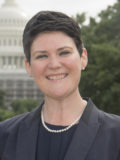
 By BJC Executive Director Amanda Tyler
By BJC Executive Director Amanda Tyler
In his address to the Religious Liberty Council in June, Rabbi David Saperstein provided a quick review of events during the first month of my tenure as executive director. The inauguration of President Donald J. Trump; the signing of an Executive Order halting travel from several Muslim-majority countries and granting preference to certain refugees fleeing religious persecution; the nomination of Justice Neil Gorsuch to the U.S. Supreme Court; the leaking of a draft “religious liberty” Executive Order that would drastically change the balancing of First Amendment rights; and the president’s vow to “totally destroy the Johnson Amendment” at the National Prayer Breakfast (a move that, if accomplished, could dramatically alter how churches operate with regard to partisan elections). Saperstein good-naturedly joked that he couldn’t chalk up all this upheaval to the change in leadership at the BJC.
Though you would think that amount of activity and what has come since would keep me firmly rooted in our Capitol Hill office, I have also spent a good amount of this year on the road, participating in four Baptist meetings (literally coast to coast, in Virginia, North Carolina, Georgia and Oregon), preaching and teaching at seven churches, and speaking at two seminaries. By the time you read this, I will have also been to Colonial Williamsburg to engage our third class of BJC Fellows during the introductory seminar to our work and addressed the Progressive National Baptist Convention in Houston.
As is often the case when it comes to travel, I’ve learned a tremendous amount from these opportunities to get out of familiar surroundings and meet and visit with our partners across the country. These visits, particularly to churches, have given me a glimpse at the diversity and warmth of our communities of faith.
The great affection that Baptists of many stripes hold for the BJC is apparent. That is a testament to the 81 years that have come before, and most immediately, to the excellent leadership of Brent Walker. I’m humbled by and grateful for the encouragement and prayerful support I’ve personally received.
From my conversations, I have sensed a robust energy for our work and desire to be engaged with the challenges we face now. I have been impressed by the eloquence of clergy and churchgoers when talking about how changing the “Johnson Amendment” would threaten the independence, autonomy and unity of their church families. They are eager to add their names and comments to Faith-Voices.org, the effort promoting the support of faith leaders for current law that keeps partisan candidate endorsements out of tax-exempt churches.
At our RLC Luncheon in Atlanta, we gathered with 600 of our religious liberty advocates and welcomed many more via Facebook live for a “Call to Action” to support our work not only with dollars but also with deeds of loving and knowing our neighbors. I had the opportunity to share some of the stories of interfaith friendships that I have heard, such as the people of Smoke Rise Baptist Church – located near Atlanta – who rallied in support of their Muslim neighbor when his small business was vandalized and robbed; and Wilshire Baptist Church in Dallas participating in interfaith Shabbat with Temple Emanu-El and engaging in dialogues on the tough issues of the day. It is my hope that such stories can inspire action, and I ask that you let the BJC know about more examples so we can help share those stories with others.
Of course, the Baptist tradition of standing up for religious freedom for all is not new. One of the great privileges of my work so far this year has been to tell that story, a reminder to the many who know it and a welcome surprise to the many more who do not. Four centuries ago, Baptist Thomas Helwys defended the rights of “heretics, Muslims, Jews, or whatsover,” while Roger Williams allowed for “a permission of the most Paganish, Jewish, Muslim, or Antichristian consciences and worships.” Their words seem thoroughly modern and relevant today. Baptist preacher John Leland’s pronouncement to “[l]et every person speak freely without fear, maintain the principles that he believes, worship according to his own faith, either one God, three Gods, no God, or twenty Gods; and let government protect him in doing so” still sounds revolutionary 226 years later.
We need to keep telling our stories, both these old ones and our new ones. Our work in Washington is challenging, no doubt, but getting outside the Beltway has provided quite a bit of hope for the future.
From the July/August 2017 edition of Report from the Capital. You can also read the digital version of the magazine or view it as a PDF.




